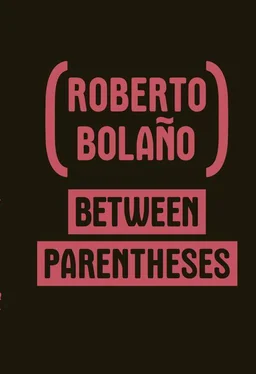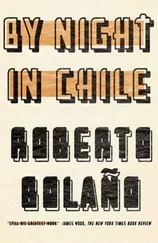Roberto Bolaño - Between Parentheses - Essays, Articles and Speeches, 1998-2003
Здесь есть возможность читать онлайн «Roberto Bolaño - Between Parentheses - Essays, Articles and Speeches, 1998-2003» весь текст электронной книги совершенно бесплатно (целиком полную версию без сокращений). В некоторых случаях можно слушать аудио, скачать через торрент в формате fb2 и присутствует краткое содержание. Год выпуска: 2011, Издательство: New Directions, Жанр: Публицистика, Критика, на английском языке. Описание произведения, (предисловие) а так же отзывы посетителей доступны на портале библиотеки ЛибКат.
- Название:Between Parentheses: Essays, Articles and Speeches, 1998-2003
- Автор:
- Издательство:New Directions
- Жанр:
- Год:2011
- ISBN:нет данных
- Рейтинг книги:4 / 5. Голосов: 1
-
Избранное:Добавить в избранное
- Отзывы:
-
Ваша оценка:
- 80
- 1
- 2
- 3
- 4
- 5
Between Parentheses: Essays, Articles and Speeches, 1998-2003: краткое содержание, описание и аннотация
Предлагаем к чтению аннотацию, описание, краткое содержание или предисловие (зависит от того, что написал сам автор книги «Between Parentheses: Essays, Articles and Speeches, 1998-2003»). Если вы не нашли необходимую информацию о книге — напишите в комментариях, мы постараемся отыскать её.
The Savage Detectives
Between Parenthese
Between Parentheses: Essays, Articles and Speeches, 1998-2003 — читать онлайн бесплатно полную книгу (весь текст) целиком
Ниже представлен текст книги, разбитый по страницам. Система сохранения места последней прочитанной страницы, позволяет с удобством читать онлайн бесплатно книгу «Between Parentheses: Essays, Articles and Speeches, 1998-2003», без необходимости каждый раз заново искать на чём Вы остановились. Поставьте закладку, и сможете в любой момент перейти на страницу, на которой закончили чтение.
Интервал:
Закладка:
There’s a scene in Yo amo a mi mami [I Love My Mommy], the last scene in the Annie chapter, that gives us a good sense of Bayly’s talent as a storyteller. In this scene Jimmy and his mother are driving to the airport to say goodbye to Annie, who is going to live in the United States. The scene begins with Jimmy asking his mother to take him to the airport. His mother makes him beg. She says that first she has some exercises to do (aerobic, though possibly also spiritual), then she’ll take a shower, and after that she’ll drive him. Suddenly, time is short and mother and son get in the car and speed off. The way from their house in a suburb called Los Cóndores to the airport is a drive through Latin American impossibility, that is: through the desert, through the barren spaces of a continent with no exit. The description of Jimmy’s mother’s car and of the highway is like a mirage projected by other mirages.
Along the way not much happens. Jimmy’s mother accelerates, but she accelerates in third, because a lady never uses fourth gear. At a certain point they hit a dog. When they get to the airport a policeman wants to see Jimmy’s mother’s brevete — I assume that brevete means driver’s license — and she doesn’t have it and she ends up bribing the policeman by the expeditious method of buying him all the numbers in an imaginary lottery. By then Annie and her parents are already in the departure lounge and Jimmy can only say his goodbyes from the terrace, with waves and shouts. Strangely, the one who shouts most is Jimmy’s mother (Annie’s mother was her best friend, and for reasons beside the point the friendship has been deteriorating) and in this woman’s exaggerated cries we suddenly glimpse all her fear, her warmth, and her frustrations.
Where does Bayly come from? At first glance his literary antecedents are clear. Bayly comes directly from Vargas Llosa, especially from Conversation in the Cathedral , a novel that is, among many other things, an extremely comprehensive sampler of Peruvian Spanish. Vargas Llosa’s ear finds in Bayly’s ear its most talented disciple. Yo amo a mi mami , on the other hand, reminds me of Bryce Echenique’s A World for Julius . Of course, Vargas Llosa’s prose is weightier than Bryce Echenique’s, though the weightiness of the latter isn’t insignificant. Bayly shares with Bryce the impulse to launch himself headlong, leaving the formal plotting of the novel for later, or for right this minute, to be embarked upon in the very act of writing: Bryce and Bayly are devourers of blank pages. This isn’t the only thing they have in common: they both possess an apparently incorrigible sense of humor, they’re both autobiographical writers (or so it seems, though it doesn’t pay to trust some autobiographies), both have English last names, which is saying a lot in a country like Peru, and both are “men and sentimental,” as the song goes.
Of course, there are things that make them different and even distance them from each other, but I don’t think this is the moment to make an inventory of those dissimiliarities. In fact, another similarity occurs to me: tenderness, a kind of compassionate gaze that some see in Bryce but refuse to see in Bayly. About Baylian compassion, however, which is sometimes disguised as fierceness and cynicism, I’ll have more to say later.
A clarification, possibly unnecessary. One has to be very brave to write about homosexuality in Peru. One has to be very brave to write from homosexuality in Peru. Especially if one does it without begging the pardon of anyone, whether of those on the Right or those on the Left, who in these matters are as identical as two peas in a pod, which should lead us to the conclusion that the Left isn’t the Left it claims to be, though the Right really is the Right.
A while ago, talking to Jesús Ferrero, I was told the story of a trip he took to Guatemala. Ferrero arrives in Guatemala, gets a taxi since no one has come to pick him up at the airport, and heads into the strange city. Night is falling and the streets flow into each other as if the taxi were moving through a labyrinth, the effect magnified by the darkness and the public lighting, which we should presume deficient or possibly excessive. Suddenly the taxi driver stops, whether confused or frightened we don’t know, to consult a map of the city and Ferrero looks out the window at a group of transvestites gathered around a fire in the middle of a side street. This is it, says the driver: you can get out here. Ferrero gets out with his suitcase in his hand, and is left alone in the middle of the street without another soul in sight. The taxi leaves and the fiercest transvestites in the world come up to him. They’re Indians or mestizos. Indians, yes, or urban mestizos swept into the capital by the country’s convulsions. They’re prostitutes in the bodies of raped men. They’re men in strange bodies and in a strange city that they try vainly to remake in their own image: an alien city within a Central American capital with a bloody past. In any case, they look nothing like European transvestites. They are to European transvestites what a velociraptor is to a heron. And these barbarians moved in on Ferrero like urban guerrillas, they circled him, surrounded him, cut off any possible escape routes, and then, when things looked blackest for the novelist, they began to talk to him, exchanging remarks about colonial architecture, for example, or about Guatemala City’s maze of streets, and they ask him where he comes from, and then, with a graciousness that I can only call Mayan graciousness or pre-Colombian courtesy, they show him the right way to go, and they even walk with him for a while, because at that time of night and in that part of the city everything is dangerous, though for them nothing is dangerous.
Bayly’s words. In the same way that there is sassy behavior in Bayly’s novel, there are also lots of patas. This word has always seemed mysterious to me. A pata is a friend. Where does the word pata come from? It’s crisp, easy to pronounce, and the only word that measures up to it is the Mexican cuate , which also means friend and of whose etymology I’m equally ignorant, though everything indicates that cuate means “twin.”
Bayly’s patas aren’t like Rulfo’s cuates , clearly, or like the patas of Salvador Bondy, who I don’t think ever used the term, though they share the same shadowy provenance, because patas and cuates can both come to seem like creatures straight out of hell, but they’re all we’ve got, all we can trust.
Bayly’s characters. In Yo amo a mi mami , there’s a return appearance of the character I think is his most lovable, El Papapa, who previously appeared in Los últimos días de La Prensa [The Last Days of The Press ]. One of El Papapa’s traits is that when he goes to the bathroom to defecate he says “I’m going to feed the Chileans.” Extremely offensive and at the same time playful. I think he said the same thing in Los últimos días de La Prensa . As a Chilean, I find it a charming expression. His son-in-law, Jimmy’s father, meanwhile, is an admirer of Pinochet. This means that when Jimmy’s father goes to the bathroom he isn’t feeding the Chileans, at least not consciously.
There are those who reproach Bayly for his neglect of form. On rare occasions, I’ve been one of them. But actually I don’t think that Bayly neglects the formal aspect so much as it might seem at first glance. Especially beginning with his third novel, I think he tries to seek a form that suits his narrative strength, his inexhaustible verbal flow. Because let’s be clear: Bayly’s strength as a storyteller, his strength as a writer of dialogue, his ability to escape from any predicament, is extraordinary. Enough to satisfy any writer. No one asks Balzac to be Stendhal. All anyone asks of Balzac is that he be God. What we should demand of Bayly isn’t formal perfection but worlds, crowds, soap operas of real life, torrents of humor, what we should demand of Bayly is what he’s already giving us: the most wonderful ear in new Spanish fiction, an often poignant gaze that turns inward without complacency and that is turned on others with humor and irony and also tenderness, the tenderness of a survivor of a time that’s already past and that probably only existed in the narrator’s dreams, a Peru in its death throes or a Peru that is now only a glimmer of what it once was.
Читать дальшеИнтервал:
Закладка:
Похожие книги на «Between Parentheses: Essays, Articles and Speeches, 1998-2003»
Представляем Вашему вниманию похожие книги на «Between Parentheses: Essays, Articles and Speeches, 1998-2003» списком для выбора. Мы отобрали схожую по названию и смыслу литературу в надежде предоставить читателям больше вариантов отыскать новые, интересные, ещё непрочитанные произведения.
Обсуждение, отзывы о книге «Between Parentheses: Essays, Articles and Speeches, 1998-2003» и просто собственные мнения читателей. Оставьте ваши комментарии, напишите, что Вы думаете о произведении, его смысле или главных героях. Укажите что конкретно понравилось, а что нет, и почему Вы так считаете.












